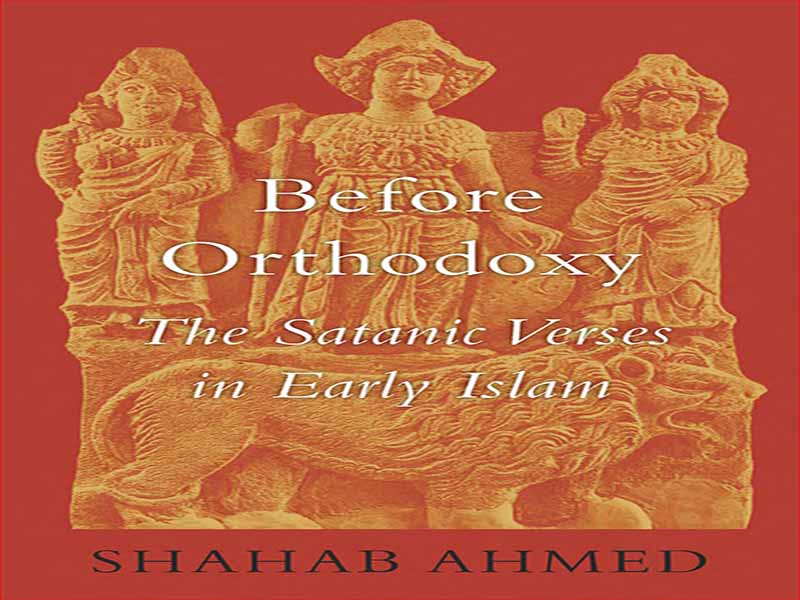- عنوان کتاب: Before Orthodoxy / The Satanic Verses in Early Islam
- نویسنده: SHAHAB AHMED
- حوزه: مسیحیت
- سال انتشار: 2017
- تعداد صفحه: 351
- زبان اصلی: انگلیسی
- نوع فایل: pdf
- حجم فایل: 2.81 مگابایت
این کتاب به عنوان اولین جلد از تاریخ نگرش مسلمانان به واقعه آیات شیطانی است که شامل هزار و چهارصد سال از آغاز اسلام تا امروز است. «حادثه آیات شیطانی» نامی است که در مطالعات غربی به آنچه در سنت اسلامی به قصط الغرانیق، «قصه جرثقیل» یا «قصه دوشیزگان» معروف است، داده شده است که به مناسبت حضرت محمد (ص) نقل می کند. گزارش شده است که کلمات اشتباهی دارد که شیطان به عنوان ارتباط الهی به او پیشنهاد کرده است، یعنی جزء قرآن است. این آیات شیطانی خدایان بت پرست قبیله پیامبر را می ستاید و به قدرت آنها در شفاعت نزد خداوند متعال اذعان می کند. بنابراین، محمد با بیان آیات شیطانی مرتکب خطا شد که اصل اساسی الهیات پیام الهی را که رسول آن بود، یعنی توحید مطلق و انحصاری خدای یگانه، به خطر انداخت. واقعی بودن و تاریخی بودن حادثه آیات شیطانی امروزه (به استثنای چند مورد) به طور جهانی توسط مسلمانان از همه فرقه ها و جریان های تفسیری – سنی، شیعی دوازده امامی، شیعی اسماعیلی، حمدی، اباضی، حافی، رد شده است. عی، مالکی، حنبلی، وهابی، سلفی، دیوبندی، بارلوی و غیره – معمولاً در درد بدعت (کفر) – یعنی در درد مسلمان نبودن. واقعه آیات شیطانی به این معناست که یکپارچگی فرآیند ارتباط الهی با محمد و در نتیجه یکپارچگی متن قرآن را زیر سؤال می برد. رد جهانی حادثه آیات شیطانی، مصداق ارتدکس اسلامی معاصر را تشکیل می دهد – یعنی این تنها حقیقتی است که یک مسلمان از حیث مسلمان ممکن است به طور مشروع در این مورد بداند. در دویست سال گذشته برای مسلمان بودن باید باور داشت که حادثه آیات شیطانی اتفاق نیفتاده است، یعنی مسلمان معاصر نباید باور کند که حضرت محمد آیات پیشنهاد شیطانی را به عنوان الهام الهی تلاوت کرده است. به عبارت دیگر، برای مسلمانان امروزی، حادثه آیات شیطانی چیزی کاملاً غیرقابل تصور است. دلیل تألیف این کتاب این است که به عنوان یک واقعیت تاریخی، این راست گرایی اسلامی مبنی بر رد واقعی بودن حادثه آیات شیطانی همیشه به دست نیامده است. یافته بنیادین جلد حاضر این است که در دو قرن اول اسلام، نگرش مسلمانان به واقعه آیات شیطانی عملاً برخلاف آنچه امروز است، بوده است.2 این جلد کمتر از پنجاه گزارش تاریخی که آیات شیطانی را روایت میکند، مطالعه میکند. واقعه ای که توسط نسل اول مسلمانان نقل شده است. این مطالعه حادثه آیات شیطانی در حافظه تاریخی جامعه مسلمانان اولیه به تفصیل نشان خواهد داد که این واقعه یک عنصر کاملاً استاندارد در حافظه مسلمانان اولیه زندگی پیامبرشان بود. به عبارت دیگر، جامعه مسلمانان اولیه تقریباً به طور کلی معتقد بودند که حادثه آیات شیطانی یک واقعیت واقعی تاریخی است. تا آنجا که به اکثریت قریب به اتفاق جامعه مسلمانان در دویست سال اول مربوط می شود، رسول خدا در واقع حداقل در یک مورد کلمات پیشنهادی شیطان را به عنوان الهام الهی اشتباه کرده است. برای مسلمانان اولیه، حادثه آیات شیطانی چیزی کاملا قابل تامل بود.
This book was conceived as the first volume of a history of Muslim attitudes to the Satanic verses incident, covering the fourteen hundred years from the beginning of Islam down to the present day. The “Satanic verses incident” is the name given in Western scholarship to what is known in the Islamic tradition as qiṣṣat algharānīq, “The Story of the Cranes” or “The Story of the Maidens,” which narrates the occasion on which the Prophet Muḥammad is reported to have mistaken words suggested to him by Satan as being Divine Communication—that is, as being part of the Qur’ān. These Satanic verses praise the pagan deities of the Prophet’s tribe and acknowledge their power to intercede with the supreme God. By uttering the Satanic verses, Muḥammad thus committed the error of compromising the fundamental theological principle of the Divine Message of which he was Messenger—namely, the absolute and exclusive unicity (tawḥīd) of the One God, Allāh. The facticity and historicity of the Satanic verses incident are today (with a few maverick exceptions) universally rejected by Muslims of all sects and interpretative movements—Sunnī, Twelver Shī‘ī, Ismā‘īlī Shī‘ī, Aḥmadī, Ibāḍī, Ḥanafī, Shāfi‘ī, Mālikī, Ḥanbalī, Wahhābī, Salafī, Deobandī, Barelvī, and so forth—routinely on pain of heresy (kufr)—that is, on pain of being deemed not a Muslim. The Satanic verses incident is understood as calling into question the integrity of the process of Divine Communication to Muḥammad— and thus the integrity of the Text of the Qur’ān. The universal rejection of the Satanic verses incident constitutes an instance of contemporary Islamic orthodoxy—that is to say, it is the only truth that a Muslim qua Muslim may legitimately hold on the matter. For the last two hundred years, to be a Muslim, one should believe that the Satanic verses incident did not take place—that is, the contemporary Muslim should not believe that the Prophet Muḥammad recited verses of Satanic suggestion as Divine inspiration. In other words, for modern Muslims, the Satanic verses incident is something entirely unthinkable. The reason for my writing this book is that, as a straightforward matter of historical fact, this Islamic orthodoxy of the rejection of the facticity of the Satanic verses incident has not always obtained. The fundamental finding of the present volume is that in the first two centuries of Islam, Muslim attitudes to the Satanic verses incident were effectively the direct opposite of what they are today.2 This volume studies no less than fifty historical reports that narrate the Satanic verses incident and that were transmitted by the first generations of Muslims. This study of the Satanic verses incident in the historical memory of the early Muslim community will demonstrate in detail that the incident constituted an absolutely standard element in the memory of early Muslims of the life of their Prophet. In other words, the early Muslim community believed almost universally that the Satanic verses incident was a true historical fact. As far as the overwhelming majority of the Muslim community in the first two hundred years was concerned, the Messenger of God did indeed, on at least one occasion, mistake words of Satanic suggestion as being of Divine inspiration. For the early Muslims, the Satanic verses incident was something entirely thinkable.
این کتاب را میتوانید از لینک زیر بصورت رایگان دانلود کنید:
Download: Before Orthodoxy





































نظرات کاربران